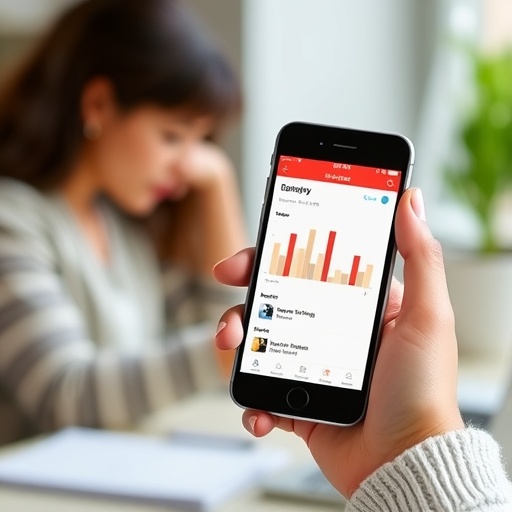In the relentless pursuit to enhance workplace well-being and productivity, a groundbreaking study emerging from Japan’s Keio University introduces a novel approach to boosting employee engagement through digital innovation. The study delves into the practical application of a smartphone-based intervention aimed at augmenting work engagement, a construct characterized by vigor, dedication, and absorption. This intervention, materialized in the form of the WEDiary app, leverages positive reflection exercises to foster a sustained psychological uplift among workers, a strategy markedly distinct from the conventional corporate wellness paradigms.
Work engagement transcends mere job satisfaction or motivation; it embodies a persistent positive state of mind intertwined with energetic resilience and wholehearted involvement in work-related tasks. Engaged employees demonstrate heightened creativity, proactivity, and a reduced propensity for burnout, ultimately leading to superior health outcomes and overall life satisfaction. Despite its critical importance, evidence-based, scalable interventions to foster work engagement have been surprisingly scarce, especially those that employees can seamlessly integrate into their daily lives without extensive organizational overhead.
Addressing this gap, Professor Akihito Shimazu and his research team developed WEDiary, an innovative smartphone application designed to encourage workers to reflect on their daily accomplishments and positive experiences at work. Unlike traditional diaries that might capture a broad spectrum of daily events, WEDiary specifically prompts users to focus on their successes, actively steering their cognitive processing toward positive reinforcement. This design is rooted in psychological theories positing that the accumulation of positive emotions, rather than fleeting instances, forms the bedrock for durable increases in work engagement.
The operational mechanics of WEDiary involve users setting a weekly goal and then completing daily entries that highlight their achievements related to these objectives. By doing so, the app nudges individuals to maintain a constructive outlook on their workday events, reinforcing a cycle of positivity that contributes to emotional and motivational resource building. This reflective practice, facilitated digitally, is both time-efficient and accessible, catering to the modern workforce’s need for flexible, user-friendly well-being tools.
To rigorously evaluate the efficacy of WEDiary, the team executed a robust randomized controlled trial encompassing 600 Japanese workers, evenly divided into intervention and control cohorts. Over two weeks, participants in the intervention group engaged with the app daily, while the control group received no such intervention. The trial measured changes in the participants’ work engagement levels, with particular attention paid to the dimensions of vigor and dedication, both core indicators of psychological investment in one’s work.
The findings, both statistically significant and practically meaningful, revealed that the use of the WEDiary app engendered notable improvements in work engagement after just two weeks. More impressively, these elevated levels of engagement persisted for at least three weeks following cessation of the intervention, pointing to the app’s potential for fostering lasting psychological benefits rather than transient mood boosts. This durability highlights the app’s ability to induce a sustainable shift in workers’ psychological attitudes toward their jobs.
Such results underscore the transformative potential of digital health interventions in occupational settings, particularly in countries like Japan where long working hours and work-related stress remain pervasive societal challenges. The WEDiary app emerges as a scalable, cost-effective tool that organizations can deploy without the logistical complexity of traditional wellness programs. Its simplicity markedly lowers barriers to adoption, facilitating integration into diverse workplace contexts, including remote or hybrid work environments.
Professor Shimazu emphasizes that the success of WEDiary rests on its alignment with contemporary workforce demands for psychological self-management and autonomy. As employees gain agency over their mental well-being through self-guided reflective practices, organizations benefit from a more engaged, resilient, and motivated workforce. This cultural shift towards digital self-care stands to redefine how employers approach mental health, extending beyond reactive strategies to proactive, preventive engagement.
The study also illuminates the critical role of positive psychology principles within organizational behavior interventions. By systematically cultivating positive emotional experiences at work, the app aligns with broaden-and-build theory, which suggests that positive emotions expand cognitive and behavioral repertoires, thereby enhancing one’s personal resources. This theoretical underpinning not only bolsters the app’s conceptual framework but also provides actionable insights for designing future interventions targeting workplace mental health.
Furthermore, the cross-disciplinary collaboration behind the development and evaluation of WEDiary—incorporating expertise from psychology, nursing, occupational health, and productivity sciences—illustrates the multifaceted nature of tackling work engagement challenges. This integrative approach ensures the app’s design is both empirically grounded and practically relevant, resonating with the complex reality of work-life dynamics in the 21st century.
While the current trial’s focus was on Japanese workers, the implications of this research extend globally. Work engagement is a critical determinant of employee well-being and organizational success worldwide. Hence, WEDiary’s model offers a blueprint adaptable to various cultural and occupational contexts, potentiating widespread enhancements in workforce mental health through technology-mediated positive reflection.
In synthesis, the introduction of the WEDiary app represents a significant leap forward in the quest to foster meaningful, sustained work engagement through accessible, digital interventions. By harnessing the power of positive reflection and the ubiquity of smartphones, this innovation paves the way for healthier, more vibrant workplaces capable of thriving amidst the complexities of modern work life. Continued research and development efforts inspired by this study hold promise for further breakthroughs in employee well-being and organizational productivity on a global scale.
Subject of Research: People
Article Title: Effects of a Smartphone-Based Positive Reflection Diary on Work Engagement Among Japanese Workers: A Randomized Controlled Trial
News Publication Date: 25-Sep-2025
References: DOI: 10.2196/55664
Image Credits: Professor Akihito Shimazu from Keio University, Japan
Keywords: Psychological science, Mental health, Applied sciences and engineering, Health and medicine




